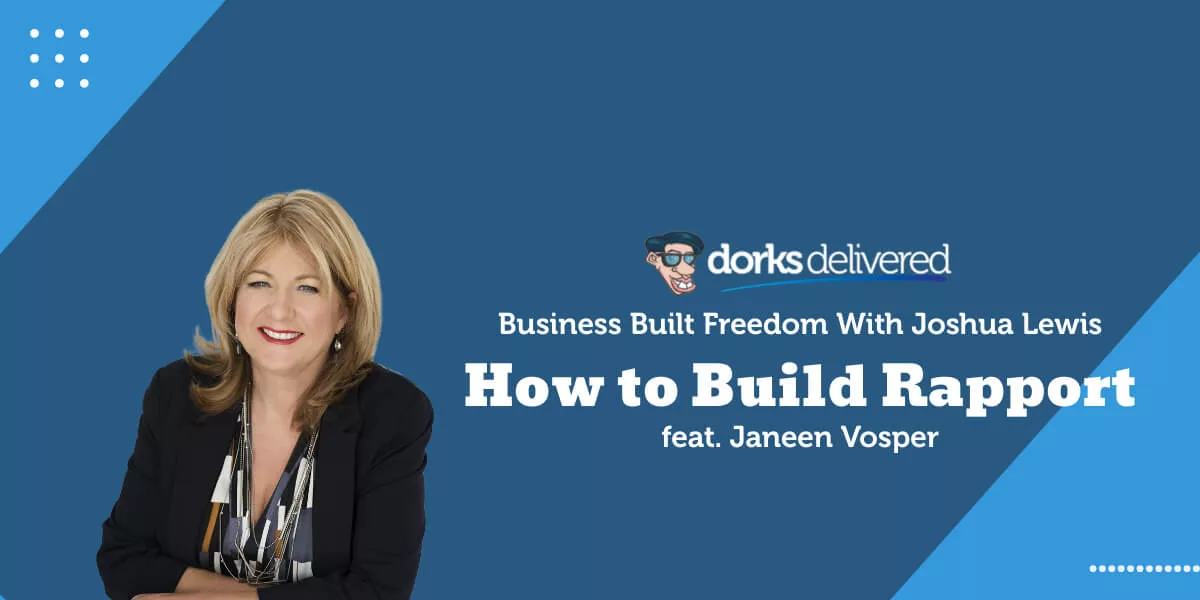Building rapport is one of the most crucial aspects of making sales. With great rapport, you can establish a strong connection with the customer, foster trust, and increase the likelihood of making a sale. Josh was joined by Janeen Vosper from SpeechPerfect.com to talk about rapport and how it works for your business.
What Is Rapport
Rapport is building a connection with somebody on an unconscious level. There’s something about that person that you feel you really like that person. You’ve got a connection with the person but somehow you’re not sure what it is.
Rapport Begins Negatively

There’s an automatic no. People don’t realise that it happens when somebody is trying to sell us, and then that person has got to try and get through that no. I hate to say this, but how that person looks makes a big difference with that connection. If somebody is in a suit and tie comes into a tradie’s house, then there’s going to be that disconnect immediately. If someone comes to the door and they’re in jeans and T-shirt and a little more casual, then the clipboard might put you off initially, but there’s something in there. At least there is a little bit more connection with that person.
How someone looks really does make a difference in that first instant. We’ve got about 3 seconds to form our first opinion.
Selling Is About Relationships
When we’re connecting with somebody and selling to somebody, it’s about relationships. It’s about having some form of commonality. We tend to like someone if they like us or if they understand our problem. When I do my sales coaching, it’s all about solving problems. It’s not about selling anything to anybody. I say I’ve never sold anything to anybody, but I get a lot of people to buy things from me, which is a different switch, because I just want to solve problems. That part is building rapport with someone.
If you’re being sold at all the time being spoken at, nobody likes that. It just sort of gets you back up. We want to build relationships with somebody. It might have worked in the 1950s and 1960s when we had the door-to-door vacuum cleaner salesperson.
Actually, we had someone here a while ago who was trying to sell this vacuum cleaner worth $2,500. This guy was nice. My husband and I just were open to hearing about it because it looked like a really fancy vacuum cleaner, but he kept trying to push and push and push, so we just got our backs up. I think it’s that pushing as opposed to solving a problem that trying to learn about the person you’re solving the problem for.
Remove repetition in your operations so you can have more time for your clients.
Don’t Overthink
I find that you can overthink it. If you’re overthinking it, you’re not going to be yourself and you’re not going to be natural. It’s so important that you pick up skills as you go along and you learn skills on how to sell and how to do it well, how to communicate well, how to listen to what people’s needs are, how to ask the right questions so that you get a full understanding of what their needs are so you can address their problems.
One of the most important factors of that is to be able to listen and really hear what their problem is and what you’re going to address. Delivering it with a particular tone and even knowing how to put a comma in a sentence is important.
A woman, without her man, is nothing.
A woman: without her, man is nothing.
There are two completely different ways of saying the same words. The tone is important.
Ask the Right Questions
It’s also important to know how to ask open-ended questions in a sales conversation so that you’re getting those answers that you want and you can build on what the person is saying and you can help them. But it’s also important to know when to ask closed questions so that you can stop and ask somebody for a sale.
Sometimes I think car salesmen are the best ones at doing this. They’ve got all this information from you, and at the end they say, if I can get you the deal today, will you sign? There’s no out then because you’ve gone “all right.”
By listening to somebody, you’re going to build rapport and not be talking over them.
Turn your IT into a utility so you can have more time to work on your business.
Hiring Someone for a Sales Role
When I worked as a general manager of sales for the largest privately owned first aid company in Australia, I had a sales team between 16 and 20, and we kept a lot of our team for a very long time. But each time I did employ somebody else, it was not based on whether they could sell anything.
It was the person with whom we built the best rapport during the interview because that was the person who is going to go out and do that with clients. You can always learn product information. If you are selling fitness equipment and you’re overweight, it’s a bit tricky to get that message across in the first 3 seconds to form a first opinion. If you’re in the world of really doing anything, it’s that rapport building and then just learn the products.
You have to demonstrate your knowledge and expertise. If it is more of a service-based industry, I think it’s important that you come from a knowledge base for that. You still got to build rapport with people as well as credibility, likeability, and trustability.
We listen and we heard you. That’s why we launched the Dollar IT Club. Learn more about it!
Ask But Don’t Interrogate
When I was in that GM role, I used to go to a lot of networking events nearly on a weekly basis. We invite guests but when speaking to on the phone or if they couldn’t come, they’d send somebody else and you’d have the evening at the table meeting strangers. I’d tell my husband that I made friends and what I learned about that person, and my husband couldn’t believe I got that information. But that’s the point of asking people questions without sounding like they’re being interrogated.
Pacing and Mirroring

In rapport building, if somebody moves in one way, then you move in the other way and mirror them, that is freaky. If you’re doing it well, nobody will notice and you can lead people into mirroring you. That’s where you really know that you’ve got somebody on your side with you when they start mirroring what you are doing. You can mirror the blink rate. But using the way you say things and recognising how somebody else is using their language and the types of words they’re using or the predicates they’re using, whether they’re quite visual people and they’re using lots of visual words.
It’s really easy to read through an email you’ve got from somebody and see what is more comfortable with them and their way of expressing themselves. If you respond using similar words, then for some reason, unconsciously, they’re going to notice that you’re speaking their language. It’s a bit harder learning to listen for it.
We listen and we heard you. That’s why we launched the Dollar IT Club. Learn more about it!
How to Slow Down When Talking
I’ve got a client, and he talks really quickly. He’s got a big press gig coming up shortly, and we’ve been working to get him to slow down for quite a few weeks. There’s a little exercise I can give you that will help. You just read off some material and every second word you use is the word 100—I 100 Janeen 100 Vosper 100 owner 100 of 100 Speech 100 Perfect 100—then you repeat the same sentence and you will say it slower.
As a presenter, you use words right across the space and you loop those words through. I’m highly visual, and I’ll tend to use many visual words, but if I’m presenting, I change that up and loop it through other words so that I can spread it out to the audience, hearing me feeling me understanding me, seeing what I’m doing.
Can You Break Rapport?
There are definitely things that you can do that can make people uncomfortable. I remember going with some friends to a friend’s place and when he got the porno movies out, it was definitely something that broke rapport. It was not the place. It certainly made people uncomfortable.
When you’re presenting to people, say you’re on stage, when you put a lectern or something in front of you and you don’t look at your audience, then you don’t necessarily build rapport and you can break rapport. If you’re not looking at people, it doesn’t matter how good your presentation is if you don’t engage the audience and make them feel you’re speaking to them. That can definitely break rapport.
Neuro-Linguistic Programming
The things I mentioned previously —pacing, matching, mirroring—are neuro-linguistic programming depending on what people know of it. To do it is not to trick people, but to step into somebody else’s space in the world that they feel comfortable with you.
If you’ve got the skill to do that, then that’s one of the most important sales skills that you can possibly have. You want people to feel comfortable with you, know that they can trust you, and think that you are one of them.
Some people make decisions straight away, but the logic thinkers would want more logic or sense behind it. So they just won’t make a decision because they like the person. Even if the product is good, but the person is sleazy, some people will still make a decision based on the product and the value that the product offers. Most people will make a decision based on the person in the room, and they’ll go find another product that does the same thing and something that they can feel comfortable with that person.
There’s a video that’s going around, and I use it in training. The CEO of Samsung went to present on the curved TV and he just blew it. His teleprompter went, he forgot what he was going to say, and he walked off the stage rather than try to get everyone engaged or do something. He just lost it with the audience. He didn’t even attempt to build any connection with the audience at all.
Whether you need to work on your products or want to go on holiday, you can count on our top tier support service. Contact us!
Must Read: Good Girls Do Sell by Janeen Vosper
I usually say my book is for women or any smart men. It’s not necessarily on this topic, but it explains a lot of the thinking like is Malcolm Gladwell the tipping point and why some people can influence situations more than other people.
I think the most important thing is don’t try and be somebody else. Don’t try and force a sale. Don’t feel desperate because it bleeds out somebody if you’re feeling desperate. Learn how to ask the right questions. Remember we have two ears and one mouth, so keep it to that ratio.
It really does come down to mindset. I just have to let other things go and just focus on what I do.
Turn your IT into a utility! Schedule a free consultation to see how technology can help you grow your business.
[module-379]































